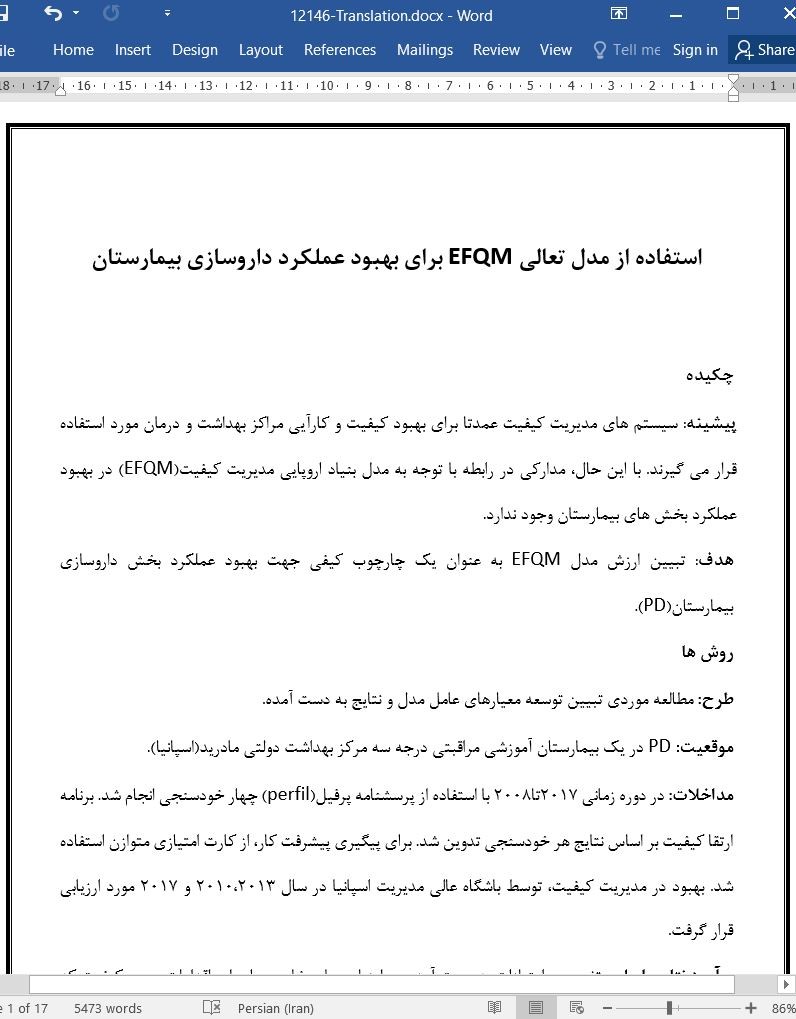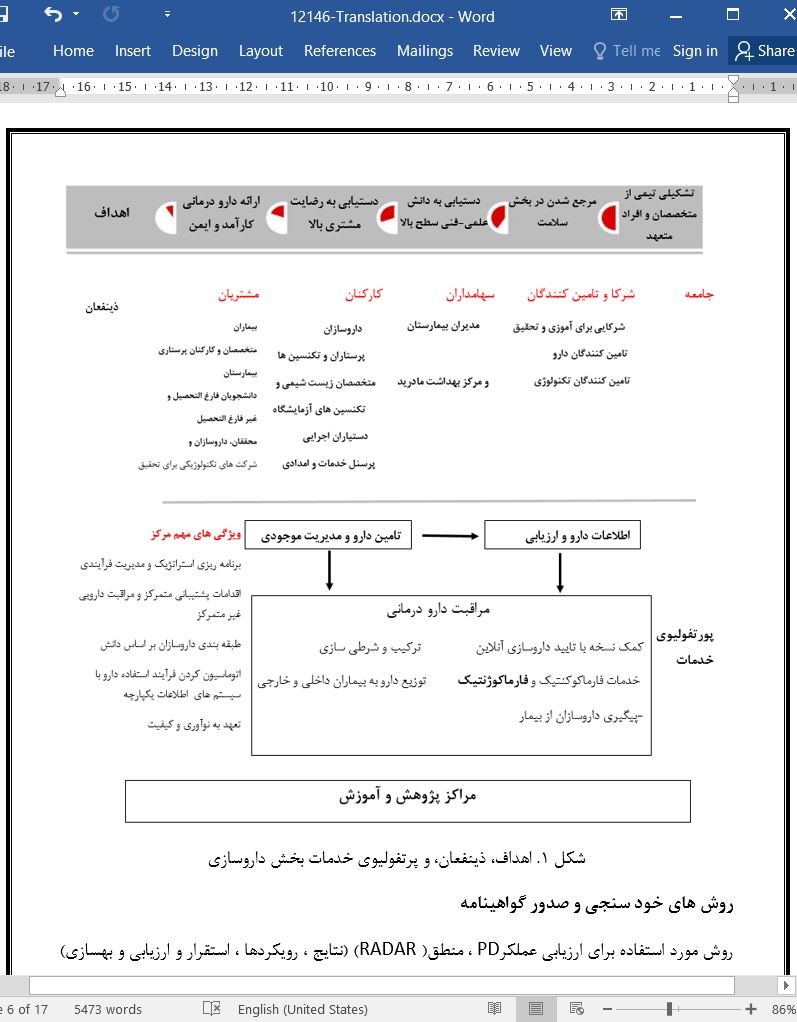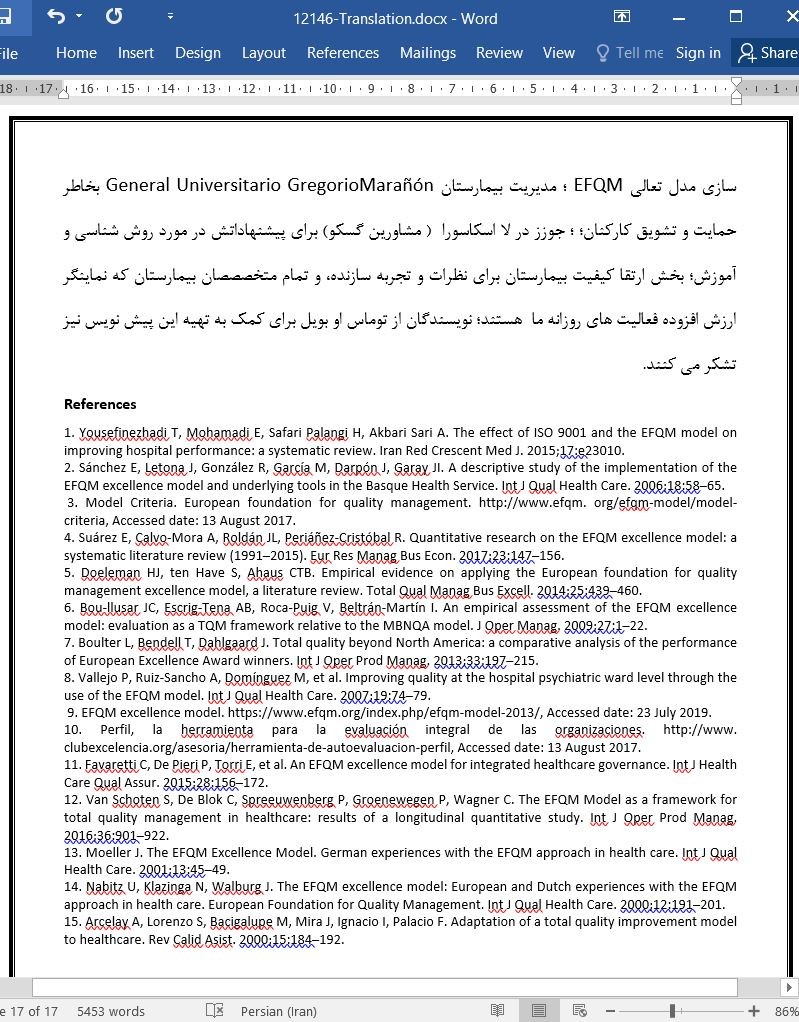
استفاده از مدل تعالی EFQM برای بهبود عملکرد داروسازی بیمارستان
چکیده
پیشینه: سیستم های مدیریت کیفیت عمدتا برای بهبود کیفیت و کارآیی مراکز بهداشت و درمان مورد استفاده قرار می گیرند. با این حال، مدارکی در رابطه با توجه به مدل بنیاد اروپایی مدیریت کیفیت(EFQM) در بهبود عملکرد بخش های بیمارستان وجود ندارد.
هدف: تبیین ارزش مدل EFQM به عنوان یک چارچوب کیفی جهت بهبود عملکرد بخش داروسازی بیمارستان(PD).
روش ها
طرح: مطالعه موردی تبیین توسعه معیارهای عامل مدل و نتایج به دست آمده.
موقعیت: PD در یک بیمارستان آموزشی مراقبتی درجه سه مرکز بهداشت دولتی مادرید(اسپانیا).
مداخلات: در دوره زمانی 2017تا2008 با استفاده از پرسشنامه پرفیل(perfil) چهار خودسنجی انجام شد. برنامه ارتقا کیفیت بر اساس نتایج هر خودسنجی تدوین شد. برای پیگیری پیشرفت کار، از کارت امتیازی متوازن استفاده شد. بهبود در مدیریت کیفیت، توسط باشگاه عالی مدیریت اسپانیا در سال 2010،2013 و 2017 مورد ارزیابی قرار گرفت.
برآورد نتایج اصلی: تغییر در امتیازات به دست آمده در ارزیابی های خارجی، اجرای اقدامات بهبود کیفیت که برای هر معیار عامل و نتایج شاخص های کلیدی عملکرد.
نتایج: EFQMچارچوب سودمندی برای خودسنجی و یک سیستم مطلوب برای شناسایی اقدامات بهبود، بود. این مدل به تدریج خدمات ارائه شده به بیماران ، ایمنی و کارایی دارو درمانی، بهره وری PD، رضایت کارکنان و مشتری را ارتقا داد. امتیازات ارزیابی خارجی از 300 امتیاز در سال 2010، به 400 امتیاز در سال 2013 و به 500 امتیاز در سال 2017 افزایش یافت. امتیازات تمام معیارها به ویژه در افراد، به تدریج افزایش یافت.
نتیجه گیری: EFQM ابزاری کاربردی برای بهبود عملکرد PD ، به ویژه در زمینه هایی ازجمله برنامه ریزی استراتژیک، مدیریت افراد و نوآوری بود. مشکلات اصلی، عدم ظرفیت تصمیم گیری در زمینه های مربوطه و ارزیابی مقایسه ای با سایر PD ها بود.
مقدمه
سیستم های مدیریت کیفیت عمدتا برای بهبود کیفیت و بهره وری مراکز بهداشت و درمان مورد استفاده قرار می گیرند. بعد از سازمان بین المللی استاندارد سازی ISO9001 ، مدل بنیاد اروپایی مدیریت کیفیت(EFQM) ، متداول ترین رویکرد در اروپا است.
مدل EFQM یک چارچوب غیر تجویزی مبتنی بر نه معیار است ک پیشرفت سازمان ها در مسیر تعالی را ارزیابی می کند. این مدل به خودسنجی و شناسایی نقاط قوت و ضعف با استفاده از اصول راهنمای معیار، تاکید دارد. این مدل یک ابزار با ارزش است که می تواند به سازمان ها در تشخیص شکاف های موجود در مدیریت کیفیت و نظارت بر بهبود خود، کمک کند.
نتیجه گیری ها
این تجربه نشان می دهد که اصول مدل EFQM در هر سطح سازمانی، حتی در مقیاس کوچک، مانند در بخش داروسازی مفید است. کارکردن در سطح بخش به درصد زیادی از کارکنان این امکان را می دهد که در پروژه مشارکت کنند. EFQM یک چارچوب ارزشمند برای ارزیابی دوره ای عملکرد PD است، به شناسایی اقدامات جهت بهبود مستمر ایمنی و کارایی دارو درمانی ، بهره وری PD، رضایت کارکنان و مشتریان کمک می کند. ارزیابی و بهبود معیارهای افزون بر فرآیندها مانند رهبری، مشارکت، نوآوری و رضایت حرفه ی، سیستم مدیریت کامل تر را در PD را امکان پذیر می کند.
Abstract
Background Quality management systems are widely used to improve the quality and efficiency of healthcare services. However, evidence regarding the value of the European Foundation for Quality Management (EFQM) model in improving the performance of hospital departments is lacking. Objective To describe the value of the EFQM model as a quality framework for improving the performance of a hospital pharmacy department (PD).
Methods.
Design A case study describing the development of the Enablers’ criteria of the model and the results achieved. Setting PD in a tertiary-care teaching hospital of the Madrid Public Health Service (Spain). Interventions Four self-assessments were conducted using the questionnaire “Perfil” during the period 2008–2017. A quality improvement plan was developed on the basis of the results of each self-assessment. A balanced scorecard was used to track progress. Improvement in quality management was externally evaluated by the Spanish Management Excellence Club in 2010, 2013, and 2017.
Main outcome measures Change in the scores obtained in the external assessments, the quality improvement initiatives implemented for each Enabler's criteria, and the results of key performance indicators.
Results The EFQM was a useful framework for self-assessment and a good system for identifying improvement initiatives. The model progressively improved the services provided for patients, the safety and efficiency of pharmacotherapy, productivity of the PD, and customer and staff satisfaction. The external assessment scores exceeded 300 points in 2010, 400 points in 2013, and 500 points in 2017. Scores for all of the criteria progressively improved, particularly in ‘people’.
Conclusions The EFQM was a practical tool for improvement of PD performance, especially in areas such as strategic planning, people management, and innovation. The main difficulties were the lack of decision-making capacity in relevant areas and benchmarking with other PDs.
Introduction
Quality management systems are widely used to improve the quality and efficiency of healthcare services. After the International Organization for Standardization (ISO) 9001, the European Foundation for Quality Management (EFQM) model is the most widespread approach in Europe.1,2
The EFQM model is a non-prescriptive framework based on nine criteria that assess the progress made by organizations on their path to excellence. It emphasizes self-assessment and the detection of strengths and weaknesses using the guiding principles of the criteria. This model is a valuable tool that can help organizations to recognize gaps in quality management and monitor their improvement.3
Conclusions
This experience shows that the principles of the EFQM model are helpful at any organizational level, even on a small scale, such as in a pharmacy department. Working at a department level allows a high percentage of staff members to get involved in the project. The EFQM is a valuable framework for periodic assessment of PD performance, helping to identify actions for the continuous improvement of the safety and efficiency of pharmacotherapy, PD productivity, and customer and staff satisfaction. Evaluation and improvement of criteria beyond processes, such as leadership, partnerships, innovation and professional satisfaction, enable a more mature management system in the PD.
چکیده
مقدمه
روش ها
موقعیت
پیاده سازی EFQM در PD
مدیریت کیفیت و ابزارهای پشتیبان
روش های خود سنجی و صدور گواهینامه
خودسنجی
روش های صدور گواهینامه و اعطای تعالی EFQM
نتایج
بحث
محدودیت
نتیجه گیری ها
تضاد منافع
تامین بودجه
منابع
ABSTRACT
Introduction
Methods
Setting
Implementation of the EFQM within the PD
Quality management and supportive tools
Self-assessment and certification methods
Self-assessment
EFQM excellence award and certification methods
Results
Discussion
Limitations
Conclusions
Conflicts of interest
Funding
References
- اصل مقاله انگلیسی با فرمت ورد (word) با قابلیت ویرایش
- ترجمه فارسی مقاله با فرمت ورد (word) با قابلیت ویرایش، بدون آرم سایت ای ترجمه
- ترجمه فارسی مقاله با فرمت pdf، بدون آرم سایت ای ترجمه



